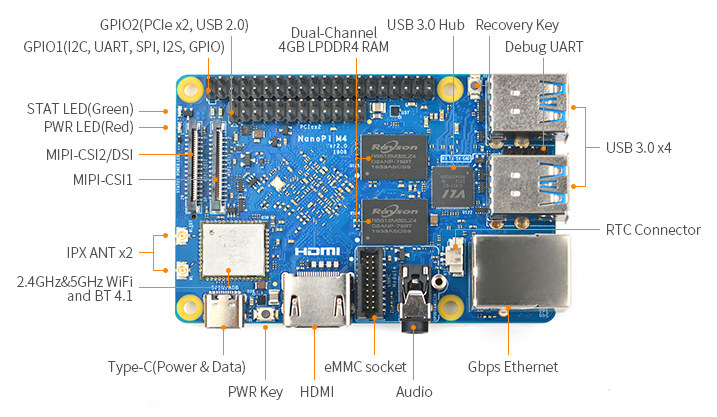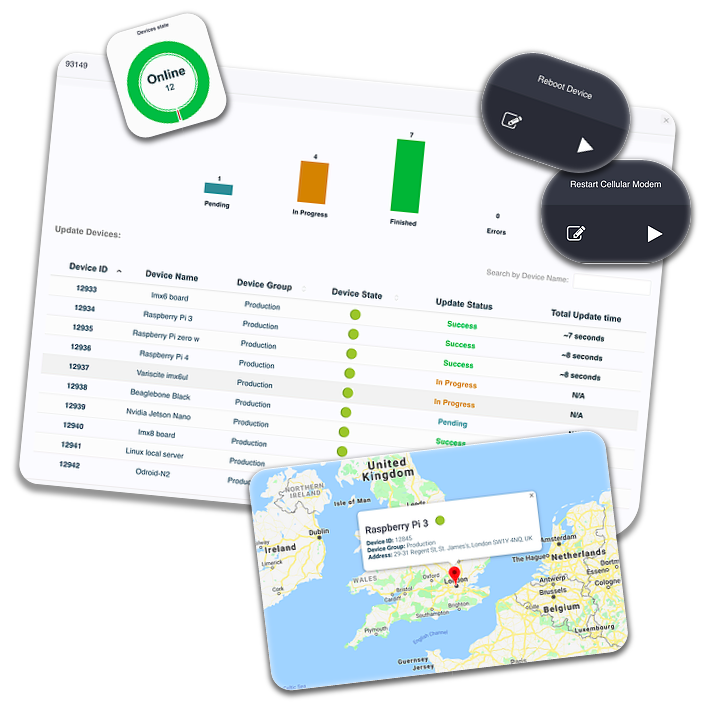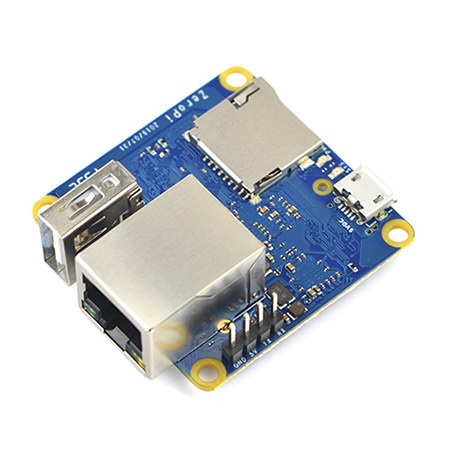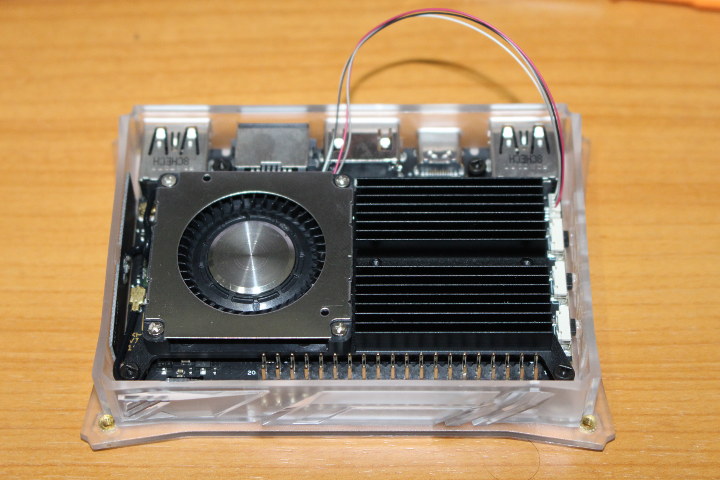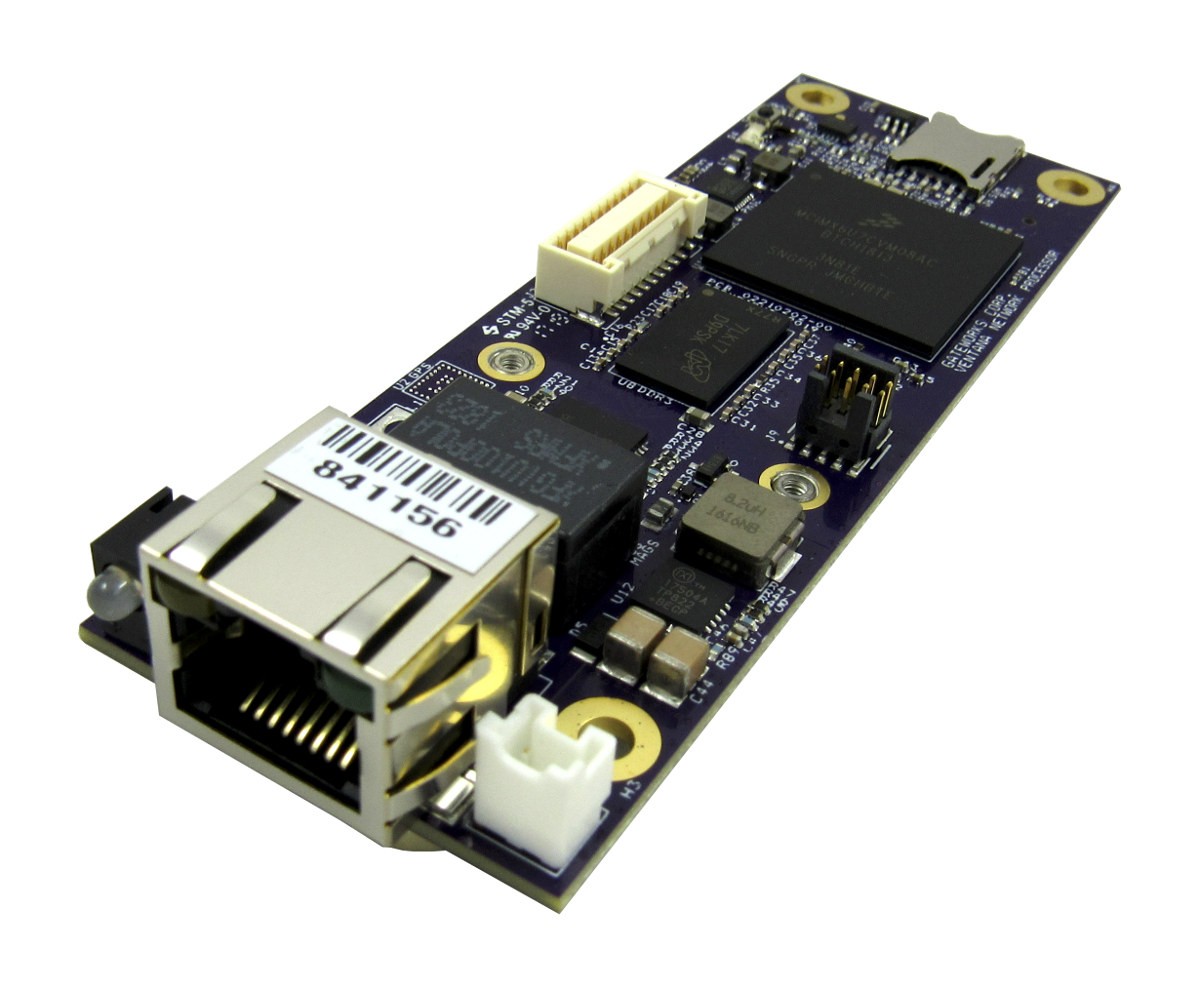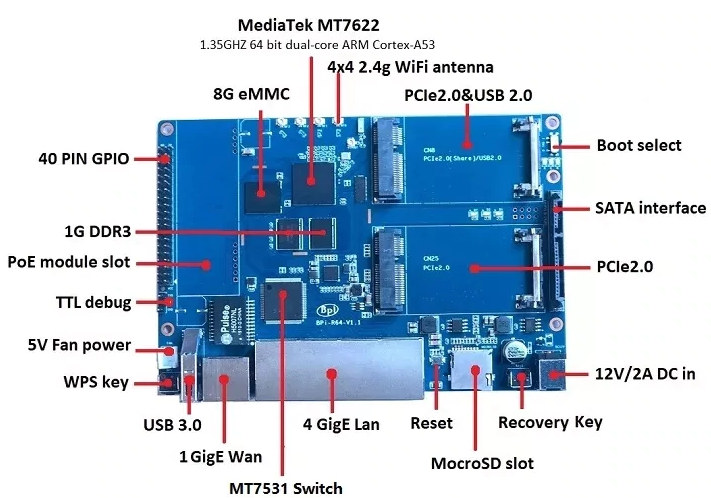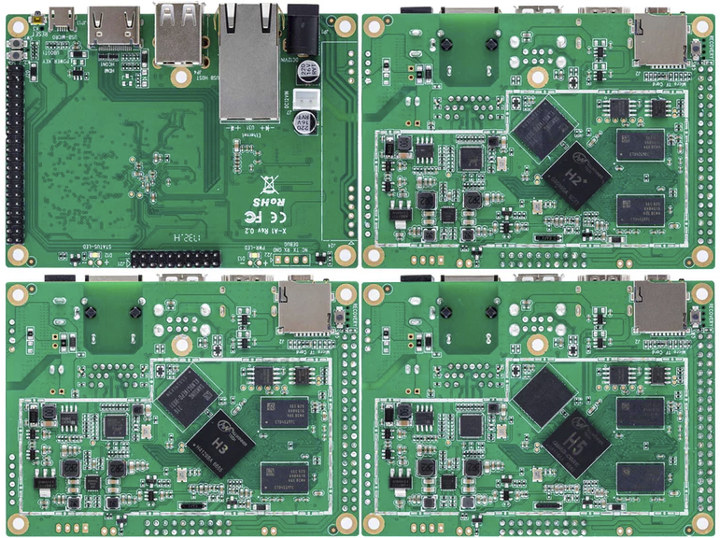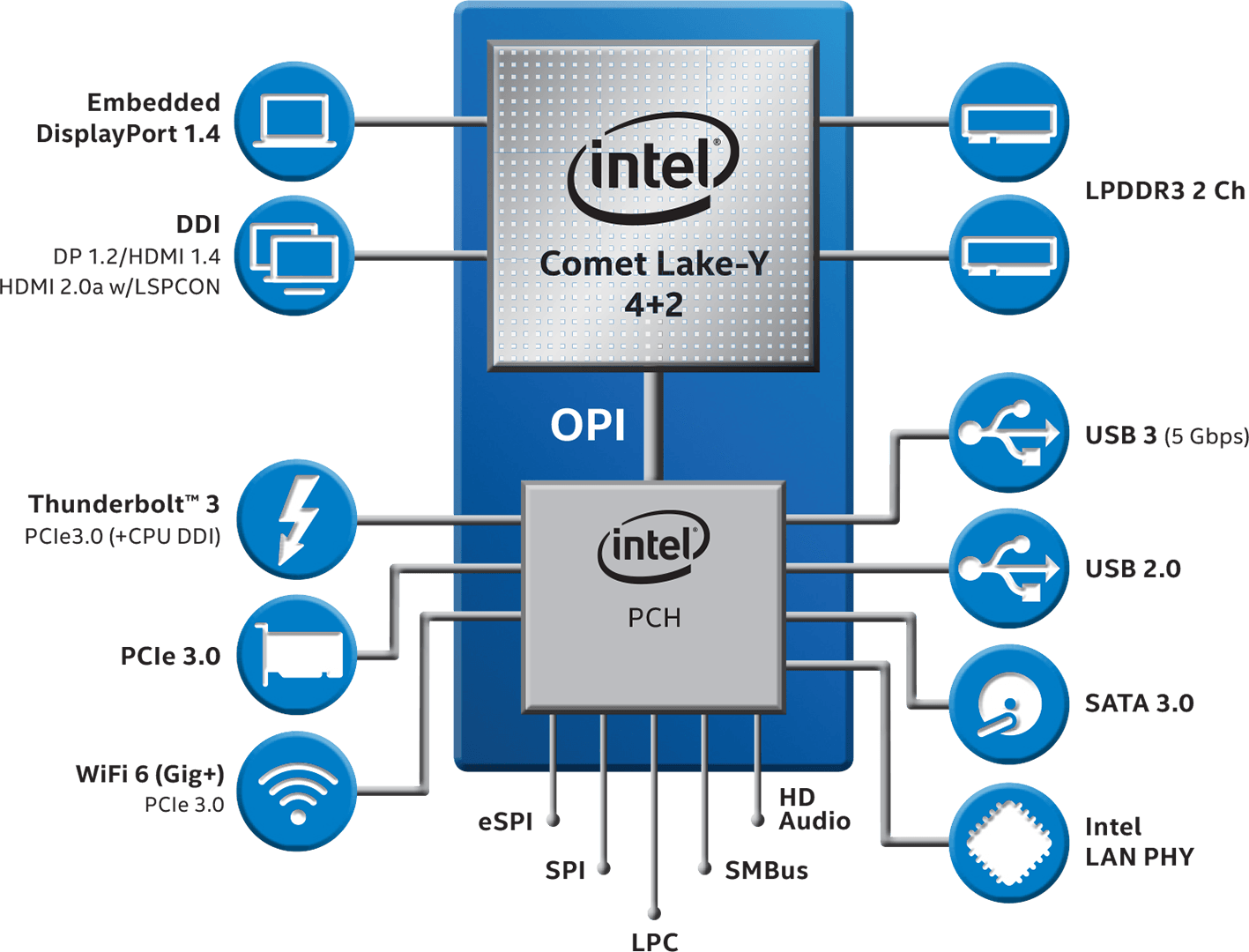FriendlyELEC NanoPi M4 is a Rockchip RK3399 single board computer that follows Raspberry Pi 3 form factor, and was launched in a year ago for $65 with 2GB RAM, and $95 with 4GB RAM. Raspberry Pi 4 introduction brought some more competition, and helped the prices drop to $50 and $75 respectively. But now the company has launched a revision 2 of the board, NanoPi M4V2 that replaces LPDDR3 memory with faster LPDDR4 memory, adds power & recovery buttons, and the audio jack now also support microphone input. It’s only available with 4GB LPDDR4 memory, and the price is lower at $70. The rest of the specifications are mostly identical: SoC – Rockchip RK3399 big.LITTLE hexa-core processor with 2x Arm Cortex-A72 @ up to 2.0GHz, 4x Cortex-A53 @ up to 1.5GHz, a Mali-T864 GPU with support OpenGL ES1.1/2.0/3.0/3.1, OpenVG1.1, OpenCL, DX11, and AFBC, and a VPU with 4K VP9 and […]
UpSwift – Manage IoT & Embedded Linux Devices Easily & Quickly
UpSwift offers a GUI based management interface to their customers to update, manage, control & diagnose IoT and embedded devices. The solution also supports OTA updates to any device which is running the Linux operating system including Raspberry Pi board and other Arm SBC’s. Because of the pull-based, client/server architecture, the client-side binary looks for updates in configurable frequent interval and executes the changes and updates. The communication between the client and the server is established over secured REST API’s. By monitoring the applications logs and other device parameters, UpSwift’s Cloud-Smart engine is capable of behaving intelligently by sending email alerts to the administrator. UpSwift Basic WorkFlow Post-registration and package selection with UpSwift Cloud-based dashboard, customers can start adding their devices into UpSwift dashboard. Depending upon the selected plans (number devices connected, features, etc.. will vary depends on the plan chosen), customers will be able to manage their products remotely. […]
FriendlyELEC ZeroPi is a Tiny Allwinner H3 SBC with Gigabit Ethernet & USB, an Optional SPI Flash
Several years ago, FriendlyELEC launched NanoPi NEO board with Allwinner H3 quad-core Cortex-A7 processor followed by NanoPi NEO2 upgrading to the Allwinner H5 64-bit Arm Cortex-A53 processor. Both boards target low-cost headless applications with I/O headers, USB and Ethernet, but while the NEO2 comes with Gigabit Ethernet, NEO SBC only features 10/100M Ethernet. The company has now been working on a new family of boards called ZeroPi that’s very similar to NanoPi NEO boards, but they do not come with any I/O headers, and the first ZeroPi board features Allwinner H3 processor, and Gigabit Ethernet. ZeroPi specifications with highlights in bold or stricken-through showing differences against NanoPi NEO: SoC – Allwinner H3 quad-core Cortex A7 @ 1.2 GHz with an Arm Mali-400MP2 GPU System Memory – 256 or 512 MB DDR3 Storage – MicroSD card slot, unmounted SPI flash Connectivity – Gigabit Ethernet via Realtek RTL8211E PHY USB – 1x […]
Khadas VIM3 Linux Benchmarks and Comparison to Raspberry Pi 4
I received Khadas VIM3 Amlogic A311D SBC in early July and started testing it with Android running some benchmarks and playing games last month. I was impressed by graphics performance and overall benchmark results in Android, especially the results I got with a heatsink matched Khadas own results with heatsink + fan. So I installed the latest Ubuntu 18.04 available at the time (July 19) in order to repeat benchmarks in Linux and see how it goes. System info in Ubuntu 18.04:
|
1 2 3 4 5 6 7 8 9 10 11 12 13 14 15 16 17 18 19 20 |
khadas@Khadas:~$ cat /etc/lsb-release DISTRIB_ID=Ubuntu DISTRIB_RELEASE=18.04 DISTRIB_CODENAME=bionic DISTRIB_DESCRIPTION="Ubuntu 18.04.2 LTS" khadas@Khadas:~$ uname -a Linux Khadas 4.9.179 #73 SMP PREEMPT Fri Jul 19 09:56:46 CST 2019 aarch64 aarch64 aarch64 GNU/Linux khadas@Khadas:~$ df -h Filesystem Size Used Avail Use% Mounted on udev 305M 0 305M 0% /dev tmpfs 187M 9.5M 177M 6% /run /dev/rootfs 15G 2.6G 12G 19% / tmpfs 931M 0 931M 0% /dev/shm tmpfs 5.0M 4.0K 5.0M 1% /run/lock tmpfs 931M 0 931M 0% /sys/fs/cgroup tmpfs 187M 12K 187M 1% /run/user/1000 khadas@Khadas:~$ free -m total used free shared buff/cache available Mem: 1861 358 1100 10 402 1479 Swap: 930 0 930 |
I decided to install armbianmonitor to draw some nice temperature charts as I did with Raspberry Pi 4:
|
1 2 3 4 5 6 |
wget https://github.com/armbian/build/raw/master/packages/bsp/common/usr/bin/armbianmonitor sudo cp armbianmonitor /usr/bin/ sudo chmod +x /usr/bin/armbianmonitor sudo apt-key adv --recv-keys --keyserver keyserver.ubuntu.com 2C0D3C0F sudo wget http://goo.gl/vewCLL -O /etc/apt/sources.list.d/rpimonitor.list sudo armbianmonitor -r |
But I had some error during installation:
|
1 2 3 4 |
sudo armbianmonitor -r Installing RPi-Monitor. This can take up to 5 minutes. Be patient please/usr/bin/armbianmonitor: line 189: /etc/armbian-release: No such file or directory Now you're able to enjoy RPi-Monitor at http://192.168.1.8:8888 |
And while I can load the webpage with top menu appearing, it won’t show any data, as its name implies it may only work in Armbian. SBC Bench on Khadas VIM3 Let’s download SBC bench:
|
1 |
wget https://raw.githubusercontent.com/ThomasKaiser/sbc-bench/master/sbc-bench.sh |
Note that I had […]
Gateworks GW5913 Compact NXP i.MX 6 SBC Supports PoE, GPS and 4G LTE Cellular Connectivity
Gateworks has announced a new Ventana SBC similar to their GW5530 board with 4G LTE connectivity, as GW5913 single board computer follows the same factor, and supports 4G LTE connectivity via mPCIe cards, but it replaces the microSIM card slot by a nanoSIM card socket, and adds a Gigabit Ethernet port with 802.11at PoE support. Gateworks GW5913 specifications: SoC – NXP i.MX 6Dual dual-core Arm Cortex-A9 processor @ 800MHz System Memory – 512MB DDR3-800 SDRAM Storage – 256MB Flash, serial configuration EEPROM Connectivity Gigabit Ethernet with PoE support Optional 4G LTE via high-power (up to 8W) Gen2 Mini-PCIe socket with USB 2.0 and nanoSIM socket Optional u-blox GPS Receiver with MMCX or U.FL Antenna Connector Expansion Connector – USB, UART, I2C, DAC, DIO Misc – Real-Time Clock with battery backup, voltage and temperature monitor, programmable watchdog timer Power Supply – 8 to 60VDC input voltage range via 2-pin power connector […]
Banana Pi BPI-R64 Linux Router Board Launched for $68
SinoVoIP introduced Banana Pi BPI-R64 router board in the summer of 2018. The Linux router board is powered by MediaTek MT7622 dual-core Cortex-A53 WiFi processor with 802.11n WiFi and Bluetooth 5.0 built-in, and offers more connectivity options namely 802.11ac WiFi 5 via MT7615 chip, as well as Gigabit Ethernet ports. 4G LTE is optional via a mini PCIe socket, and a SATA port is included for storage. At the time, I envisioned an official launch in Q1 2019, but I was off by a few quarters, as the company has only just launched Banana Pi BPI-R64 on Aliexpress for $68 plus shipping. The specifications of the Banana Pi BPI-R64 board have slightly changed since last year announcement, and we’ve got a few more details: SoC – MediaTek MT7622 dual-core Arm Cortex-A53 @ 1.35GHz with dedicated network accelerator, 4×4 802.11n and Bluetooth 5 connectivity System Memory – 1GB DDR3 SDRAM Storage […]
Project-X A1-Series Production-Ready Pico-ITX SBCs are Powered by Allwinner Processors (Crowdfunding)
We already have plenty of Allwinner single board computers thanks to companies such as Shenzhen Xunlong Software with their Orange Pi boards, FriendlyELEC NanoPi boards, and Libre Computer Tritium SBCs. Those boards are fine for hobbyist’s project but may fall short when integrated into consumer products, although some products have already been launched with those board such as RetroEngine Sigma retro game console (Orange Pi), or Firewalla firewall appliance (NanoPi neo) ActPower Taiwan Ltd’s Project-X is a little different as it relies on Pico-ITX form factor targetting mass production of low volume manufacturing. Their first Project-X A1-series focus exclusively on Allwinner H-Series (H2+, H3, and H5) processor, but if the concept takes off they may launch boards equipped with processors from other silicon vendors. There are currently three Project-X A1 boards with the following key features and specifications: SoC (one or the other) Allwinner H2+ quad-core Cortex-A7 processor Allwinner H3 […]
Intel Introduces 10th Generation Comet Lake Y and U-Series Processors
10th Generation Ice Lake processors for 2-in-1 laptops and tablets, and other low-power devices have just started shipping, but Intel has now launched another 10th generation family, namely Comet Lake, that is also designed for the same type of products. But instead of being manufactured using a 10nm process, Comet Lake processors will rely on Intel’s “highly optimized” 14nm process technology leveraging “improvements in intra-node optimizations”. There will be Y-Series and U-Series like in other low-power high-performance Intel processors with respectively 7W and 15W TDP, and those processors will come as Core i3/i5/i7 parts Intel Comet Lake family is the first to offer a 6-core processor in the U-series family and will provide faster CPU frequencies, faster memory interfaces, support for Intel Wi-Fi 6 (Gig+) and Thunderbolt 3. The new processors are said to deliver up to 16% overall performance gains, and over 41% better productivity and multitasking on Microsoft […]


